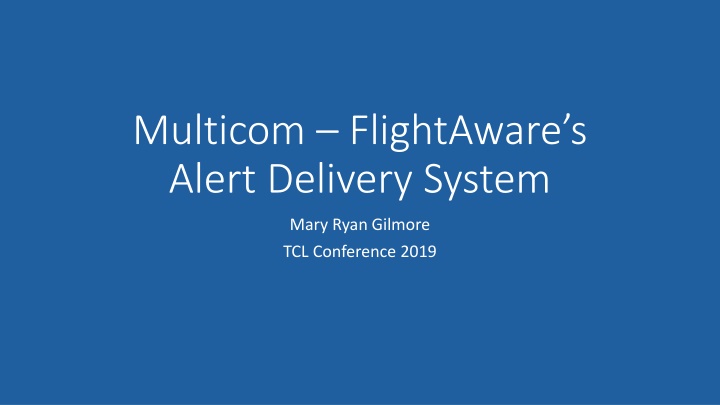
Multicom FlightAware: Revolutionizing Alert Delivery System
Discover how Multicom FlightAware's advanced alert delivery system processes millions of flight event messages daily, matches against alert triggers, and sends out alerts efficiently. Learn about the use of TCL packages to enhance performance, the evolution of server designs, and the introduction of Sqlite and Sqlbird for improved functionality. Explore the challenges faced with speedtables and the solutions implemented to overcome them, as FlightAware responds to sudden data increases by scaling up operations.
Download Presentation

Please find below an Image/Link to download the presentation.
The content on the website is provided AS IS for your information and personal use only. It may not be sold, licensed, or shared on other websites without obtaining consent from the author. If you encounter any issues during the download, it is possible that the publisher has removed the file from their server.
You are allowed to download the files provided on this website for personal or commercial use, subject to the condition that they are used lawfully. All files are the property of their respective owners.
The content on the website is provided AS IS for your information and personal use only. It may not be sold, licensed, or shared on other websites without obtaining consent from the author.
E N D
Presentation Transcript
Multicom FlightAwares Alert Delivery System Mary Ryan Gilmore TCL Conference 2019
What is Multicom? High performance alert delivery application Reads in a stream of 35 million flight event messages per day (that s 400 updates per second on average) Matches the events against more than 440,000 alert triggers Sends more than 300,000 alerts each day
Using TCL Packages to Improve Performance As FlightAware gains access to more data sources, the number of events processed per day is only increasing Improved performance by introducing sqlite and sqlbird Improved durability by introducing tclrmq and zookeepertcl
Old Multicom Design Server A Before sqlite and sqlbird were introduced, it ran on 3 servers with 16 children on each server (for 48 children total) Multicom Child 1 Speedtable Replicated Database Tables Local Server Cache Multicom Child 16
Problems with Speedtables Design Does not have an OR functionality like postgres There was a lot of write contention on the speedtable cache because all 16 of the children on one server where attempting to write to it
Response Following Sudden Event Data Increase We threw more servers at the problem We started running 96 child processes across 6 servers
Introducing Sqlite and Sqlbird Sqlite solved the OR problem (speedtables) foreach field {base_id ident reg origin destination aircrafttype} { set search_list [list [list match $field $data($field)] {true enabled}] $::st(mc_trigger_tracking) search -compare $search_list -array trigger -code { } } (sqlbird) set sql SELECT * FROM mc_trigger_tracking WHERE ident = :data(ident) OR reg = :data(reg) OR origin = :data(origin) OR destination = :data(destination) OR aircrafttpye = :data(aircrafttype) sqlbird::select $sql trigger { }
New Multicom Design After sqlite and sqlbird were introduced, it ran on 2 servers with 12 children on each server (for 24 children total) Server A Local Child Cache Multicom Child 1 Sqlbird Tables Local Child Cache Multicom Child 12
The New Problem: Database Dependence New company expectation that if the database goes down, your application does not Mutlicom was using a database table as a queue Email delivery channel Queued alerts Android delivery channel Database Apple push notification delivery channel
Using Tclrmq to Enable us to Use RabbitMQ Email delivery channel Email queue Queued alerts Android queue Android delivery channel Apple push notification queue Apple push notification delivery channel
Using Zookeepertcl to Store PITR Another thing that we used the database for was storing point in time references for each child process Moved this functionality to zookeeper
Conclusion We attribute a lot of Multicom s continued growth and success to new TCL libraries such as sqlite, sqlbird, tclrmq, and zookeepertcl Look forward to learning about new ways that we can use TCL to improve this system






















